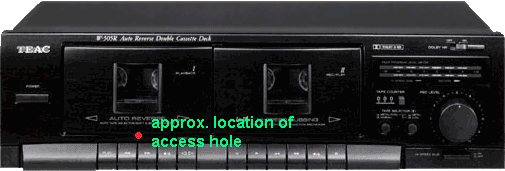View from the basement
Addendum 1: Head alignment
11/99 : I recently had an e-mail requesting information on transposing cassettes to CD and one comment I made
was to make sure the tape heads are aligned else the inferior sound quality will forever be preserved on the disc. When I was then asked how to do this, it occurred to me that posting this info
may also be useful to others. If you have a dual-well cassette deck, I strongly suggest you adjust the playback side only and don't mess with the record side, otherwise all your personal tapes
end up getting recorded at different settings. At the bottom of the tape tray there is a small hole. I always have to enlarge this hole a little to accommodate the diameter of the adjustment tool
(which is just a small phillips head screwdriver like the ones in those "pocket screwdriver sets" found at department store check-out lines for a couple bucks). The tape head is mounted by 2
screws, one anchored and the other (behind the access hole) over the mounting bracket with a compression spring underneath that pushes the one side up when you loosen the screw. This causes the
head to "yaw" and consequently line itself up to the linearity of the tape particles. Some decks that have auto-reverse and/or solenoid transport mechanisms may not be adjustable. Put in a tape
and hit play. The hole will not line up unless play is engaged. Turn up the volume and especially the treble and insert the screwdriver until you feel it engage in the screw head. By turning it
slightly clock-wise and counter-clockwise you can hear the high end come into "phase" and then turn to mud again when you've turned it too far. The entire adjustment range should not be more than
a quarter turn in either direction, and keep in mind that if you turn it too far counter-clockwise the screw will fall out and they are no fun putting back in. It takes a pretty good ear to
pin-point the exact spot, sometimes I have to use headphones and turn it up really loud with the bass all the way off. But then it doesn't have to be "exact" anyway. If you can't hear the
difference it doesn't much matter. However, even a tape that is out of alignment by a tenth of a turn (a few thousands of an inch linear deviation) can cause a 2Khz or greater loss at the high
end and have a "sweeping" or mushy sound. It seems like the newer decks are a lot more consistent than they used to be, maybe because specs for consumer decks are more standardized now, or maybe
because of more modern digital calibration equipment, but many of the older decks were either not set exactly right at the factory, were set to that manufacture's internal "standard", or over
time the locking solution has come loose from the screw head and eventually it vibrated out of alignment. As I mentioned, some decks are too sophisticated to fool with, but most garden-variety
Teacs, Sonys & Kenwoods are set up in this way. good luck.

USE YOUR BROWSER'S BACK BUTTON TO RETURN :